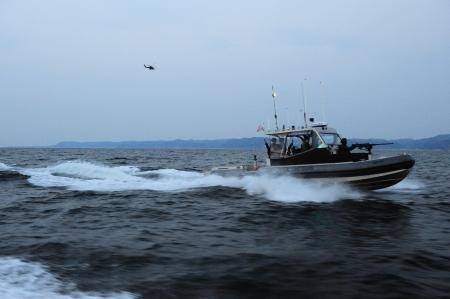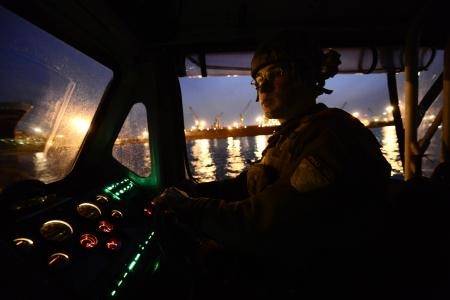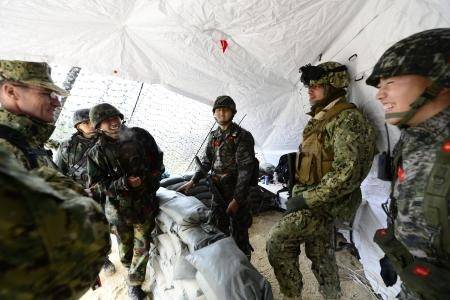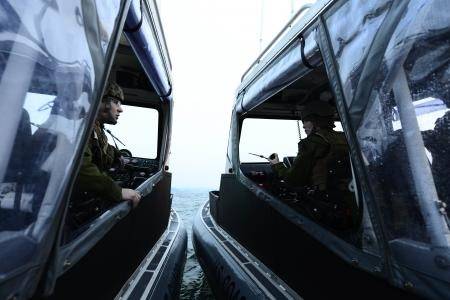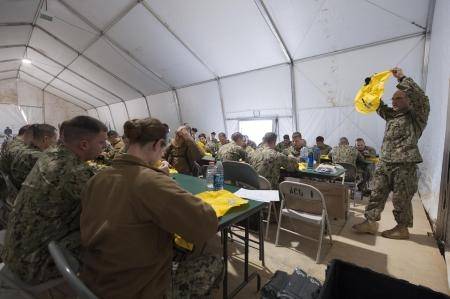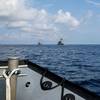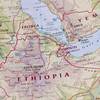Washington Coast Guard Crew Deploys to South Korea
Through chilling winds and choppy seas, five-man crews aboard small, gray security boats worked tirelessly for 10 days patrolling the waters around a massive 348-foot petroleum vessel near the coast of Pohang, South Korea.
Boat crews from Port Security Unit (PSU) 313 worked night and day to enforce a safety zone around U.S. Naval Ship Vice Adm. K.R. Wheeler and an eight-mile submerged pipeline that extended from the ship to the shores of Dogu Beach.
During Combined Joint Logistics Over-the-Shore Exercise (CJLOTS), the Wheeler simulated providing fuel for the more 1,200 personnel involved in the exercise by pumping water through the pipeline to large bladders on shore. These bladders would then be used to fuel military vehicles and equipment in a real-world scenario.
“We provided protection for the pipeline and prevented local fisherman from anchoring or dragging fishing nets across the pipe,” said Petty Officer 1st Class Jordan Gere, a reservist for eight years who has been with PSU 313 for almost three years and is a Snohomish, Wash., native. “We overcame our biggest challenge, the language barrier, by incorporating Korean Augmentation to the United States Army personnel into our boat crews to serve as interpreters.”
The KATUSA program provides the U.S. military with Korean-speaking soldiers, allowing greater military functionality and maneuverability. This exercise brings together U.S. military troops and Korean allies to build working relationships and enhance security and readiness on the Korean peninsula.
The crew of PSU 313 also provided 24-hour force protection on shore, side-by-side with Republic of Korea (ROK) Military personnel during CJLOTS.
“Security teams ran entry control points alongside the ROK Marines and ROK Navy,” said Gere. “ROK personnel helped with security and communication at the check points.”
In addition to language barriers, unpredictable weather conditions also proved challenging for PSU 313. Temperatures would fluctuate rapidly between 30 F and 70 F. The seas would be calm one minute with more than 8-foot swells the next, and winds gusted up to 50 miles-per-hour.
“Safety was always priority one,” said Coast Guard Cmdr. Daniel Clark, commanding officer for PSU 313. “In accordance with policy, the boat crews operated the TPSBs 24/7 in a broad spectrum of weather conditions and identified some mechanical areas we need to improve. This was a good opportunity and a good environment to do that.”
During roving patrols on foot along Dogu Beach, security teams would walk nearly three miles along the shore day and night, taking intermittent refuge in tents to keep warm. Shore-side security teams rotated watches through five different checkpoints, working closely with the Korean military and building relations with the Korean Navy and Marines.
“The Coast Guard provides security for ports across the United States,” said Coast Guard Rear Adm. Charles Ray, prospective Pacific Area deputy commander. “We’ve been doing this for over 200 years, and we’ve got a role to play here. The only way you develop the capability is to go do it. When our nation needs us, these guys will be ready.”








